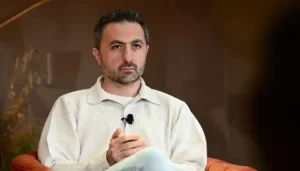Mustafa Suleyman, CEO of Microsoft AI and co-founder of DeepMind, has cautioned that the most pressing challenge posed by artificial intelligence is not widespread job loss, but the growing risk that many people may struggle to adapt to the rapid changes it brings.
In a recent interview, Mustafa emphasized that while AI is unlikely to eliminate jobs overnight, it is already reshaping roles across industries at a pace that outstrips society’s ability to reskill.
“My central worry is that many people will not be able to adapt fast enough to the changes brought by AI,” Mustafa said, adding that the disruption is less about machines replacing humans and more about whether individuals can keep up with the transformation of work itself.
Microsoft AI Chief says AI Is Redefining Jobs, Not Eliminating Them
Mustafa, who leads consumer AI products including Copilot at Microsoft, pointed out that AI is already altering the nature of work in fields such as customer service, coding, and content creation.
While the technology is enhancing productivity and streamlining tasks, it is also demanding new skill sets—particularly digital literacy, adaptability, and comfort with AI tools.
He warned that workers without access to education or training may be left behind, especially in regions or sectors where upskilling infrastructure is limited.
“The real career risk isn’t replacement, it’s resistance,” Mustafa noted, urging professionals to treat reskilling as an ongoing process rather than a one-time adjustment.
A Call for Collective Action: Government, Industry, and Education
Rather than sounding an alarm, Mustafa’s comments serve as a call to action.
He urged governments, companies, and educators to collaborate on building inclusive access to AI tools and training programs.
The goal, he said, is to empower people to thrive in an AI-enhanced economy—not just survive it.
Key areas of focus include:
- Scalable reskilling programs tailored to evolving job roles
- Digital literacy initiatives across age groups and sectors
- Ethical deployment of AI with clear user guidance and safeguards
Mustafa emphasized that career growth in the AI era will require collective learning, community support, and proactive engagement with emerging technologies.
Psychological Risks: AI Psychosis and Human-AI Attachment
In addition to workforce concerns, Mustafa raised alarms about a psychological phenomenon he termed “AI psychosis.”
He described it as a real and emerging risk where individuals lose touch with reality due to excessive interaction with AI systems.
Vulnerable users, he warned, may begin to perceive AI agents as sentient beings, leading to unhealthy emotional dependencies.
To address this, Mustafa called on the tech industry to implement ethical guardrails, including:
- Clear disclaimers about AI’s limitations
- Monitoring for signs of unhealthy usage patterns
- Collaboration with mental health professionals to study and mitigate risks
His comments reflect growing concern among tech leaders about the unintended consequences of immersive AI experiences, especially as conversational agents become more lifelike and emotionally responsive.
Note: We are also on WhatsApp, LinkedIn, and YouTube to get the latest news updates. Subscribe to our Channels. WhatsApp– Click Here, YouTube – Click Here, and LinkedIn– Click Here.



